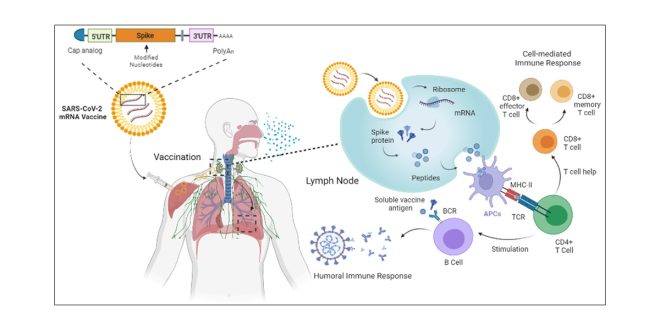Words by Dr. Bodhraj Acharya
mRNA, the molecular messenger at the heart of cellular biology, has transcended its role in protein synthesis to become the revolutionary backbone of COVID-19 vaccines, offering a groundbreaking approach to immune system education.
In the intricate world of cellular biology, mRNA, or messenger RNA, stands out as a fundamental component crucial to our understanding of how the body functions at a molecular level. The master blueprints for the bodily proteins are DNA, stored securely in the cell’s nucleus, akin to a vault. mRNA acts as a diligent messenger. Its job is to carry specific instructions from the DNA in the nucleus to the cellular machinery responsible for manufacturing proteins. Each strand of mRNA translates a particular segment of DNA into a set of instructions for building a specific protein. Once the mRNA reaches the protein-making machinery, the production process for proteins begins, following the sequence outlined in the instructions. These proteins are crucial for various bodily functions, including fighting off diseases.
In the realm of vaccines, mRNA technology stands as a beacon of hope and innovation, propelling us into a new era of disease prevention. Its flexibility and rapid development capabilities proved pivotal in responding to the urgent demands of the COVID-19 pandemic.
Recently, mRNA has leaped into the spotlight due to its revolutionary use in COVID-19 vaccines. In these vaccines, mRNA is employed to deliver instructions for making a harmless piece of the virus. This innovative approach teaches our immune system to recognize and combat the actual virus, should we encounter it, offering a groundbreaking method in vaccine development. mRNA vaccines have emerged as a shining beacon of hope and innovation.
Traditionally, vaccines have used weakened or inactivated parts of a virus to stimulate the immune response. mRNA vaccines, however, take a different approach. They use a synthetic mRNA to instruct cells to produce a protein similar to one found in the virus. This triggers an immune response, preparing the body to fight the real virus if it later invades. The COVID-19 pandemic saw the first wide-scale deployment of this technology. Before this, mRNA vaccines were a theory more than a reality, with years of research still seeming far from practical application. COVID-19 changed that, propelling mRNA vaccines into the limelight and proving their effectiveness and rapid development capabilities. The Pfizer-BioNTech and Moderna COVID-19 vaccines are prime examples of this success, demonstrating not only swift development and deployment but also high efficacy in preventing severe illness.
What makes mRNA vaccines particularly groundbreaking is their flexibility and speed of development. Traditional vaccine development is a lengthy and complex process, often taking years, if not decades. mRNA vaccines can be designed and produced more quickly. This agility is incredibly valuable in responding to fast-moving pandemics.
Furthermore, mRNA vaccines are easier to tweak. As viruses evolve, so too can the vaccines, adapting to changes in the virus’s genetic makeup. This adaptability is a game-changer in our ongoing battle against infectious diseases, offering a dynamic tool in our medical arsenal.
However, the journey of mRNA vaccines is not without challenges. Storage and distribution of these vaccines require extremely cold temperatures, posing logistical hurdles, especially in regions with limited resources. Additionally, the long-term effects and durability of immunity provided by mRNA vaccines are still under study.
Looking to the future, the potential of mRNA technology extends far beyond COVID-19. Researchers are exploring its use against a range of diseases, from flu to cancer. Cancer research, in particular, is seeing promising developments, with mRNA vaccines being tailored to trigger the immune system to target specific cancer cells.
In infectious disease control, mRNA vaccines could lead to faster responses to outbreaks, more effective seasonal flu vaccines, and even progress towards tackling historically challenging viruses like HIV. The implications for global health are immense. mRNA technology represents not just a new category of vaccines but a new frontier in medicine. Its ability to prompt rapid, targeted immune responses with a degree of flexibility and speed previously unseen opens doors to addressing numerous health challenges. As we advance, it’s crucial to continue research and development in this field, overcoming existing challenges and fully realizing the potential of mRNA vaccines. Investment in infrastructure, global collaboration, and public education will play key roles in harnessing this technology for the greater good.
mRNA vaccines, exemplified by the success of Pfizer-BioNTech and Moderna in COVID-19 prevention, signify not just a triumph over the pandemic but a transformative leap in medical science. Their adaptability, speed, and potential applications against various diseases herald a future of dynamic and targeted healthcare solutions.
In conclusion, mRNA vaccines are more than a scientific triumph; they are a testament to human ingenuity and resilience in the face of global health crises. Their emergence during the COVID-19 pandemic has not only changed the course of this particular battle but also set the stage for a new era in disease prevention and treatment. With continued research and development, the future of mRNA vaccines is bright, holding the promise of a healthier, more resilient world.
 Medicosnext
Medicosnext




